
St Michael's College, officially the University of St. Michael's College, is a constituent college of the University of Toronto. It was founded in 1852 by the Congregation of St. Basil and retains its Catholic affiliation through its postgraduate theology faculty. However, it is primarily an undergraduate college for liberal arts and sciences.
Medieval studies is the academic interdisciplinary study of the Middle Ages. A historian who studies medieval studies is called a medievalist.
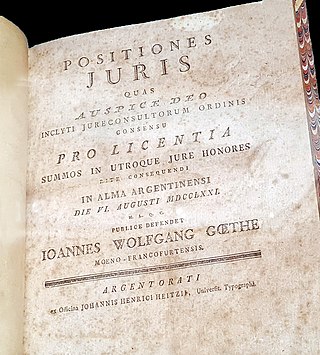
A licentiate is an academic degree present in many countries, representing different educational levels. It may be similar to a master's degree when issued by pontifical universities and other universities in Europe, Latin America, and Syria.
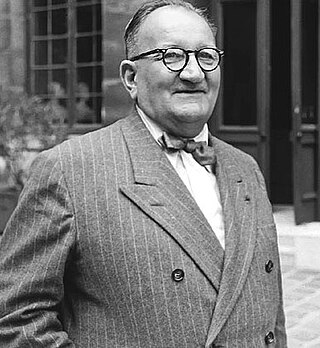
Étienne Henri Gilson was a French philosopher and historian of philosophy. A scholar of medieval philosophy, he originally specialised in the thought of Descartes; he also philosophized in the tradition of Thomas Aquinas, although he did not consider himself a neo-Thomist philosopher. In 1946 he attained the distinction of being elected an "Immortal" (member) of the Académie française. He was nominated for the Nobel Prize in Literature.
Richard Alway, is a Canadian educator and a Catholic layman. He was the first lay President and Vice-Chancellor of the University of St. Michael's College, a college at the University of Toronto. He was formerly Praeses (president) of the Pontifical Institute of Mediaeval Studies in Toronto.
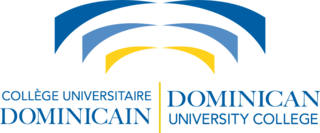
The Dominican University College is a bilingual university located in Ottawa, Ontario, Canada. Since 2012, Dominican University College has been an affiliated college of Carleton University.
Boetius de Dacia, OP was a 13th-century Danish philosopher.
Licentiate of Canon Law is the title of an advanced graduate degree with canonical effects in the Roman Catholic Church offered by pontifical universities and ecclesiastical faculties of canon law. Licentiate is the title of a person who holds an academic degree called a licence. The licentiate of canon law is the ordinary way for forming future canonists, according to Veritatis gaudium.
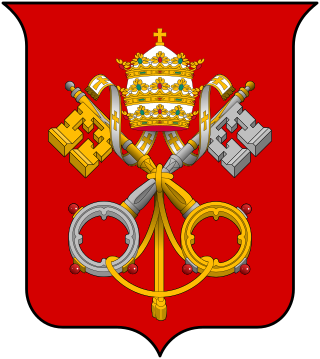
The Gregorian Consortium is a collaborative association of three pontifical universities/institutes in Rome. In 1930 the motu proprio Quod maxime of Pope Pius XI associated the Pontifical Gregorian University (Greg), the Pontifical Biblical Institute (Biblicum), and the Pontifical Oriental Institute (Orientale) into a university consortium. All three institutions belong to the Holy See and are entrusted to the Society of Jesus.
James Harry Robb was a professor of philosophy at Marquette University, and was considered an expert in medieval philosophy and of the teachings of St. Thomas Aquinas.

Norah Willis Michener PhD was the wife of Roland Michener, the 20th Governor General of Canada. As the spouse of a Governor General, she held the title of Chatelaine of Rideau Hall. She had a doctorate in philosophy from the University of Toronto.
A pontifical university is a Catholic university established by and directly under the authority of the Holy See. It is licensed to grant academic degrees in sacred faculties, the most important of which are theology, canon law, and philosophy. Pontifical universities follow a European system of degrees in the sacred faculties, granting the baccalaureate, the licentiate, and the doctorate.
John Francis Wippel was an American Catholic priest of the Diocese of Steubenville. He was a leading authority on the metaphysical thought of Thomas Aquinas. He won the Cardinal Mercier Prize for International Philosophy in 1981, two National Endowment for the Humanities Fellowships, and was named a Professor of the Pontifical Academy of Saint Thomas Aquinas. At the time of his death, he was serving as the Theodore Basselin Professor of Philosophy at the Catholic University of America in Washington, DC.
An ecclesiastical university is a special type of higher education school recognised by the Canon law of the Catholic Church. It is one of two types of universities recognised, the other type being the Catholic university. Every single ecclesiastical university is a pontifical university, while only a few Catholic universities are pontifical.
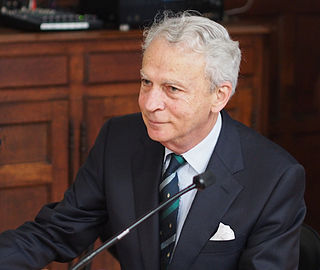
Brian Stock is an American historian. He is a historian of modes of perception between the ancient world and the sixteenth century. He was Rouse Ball Student at Trinity College, Cambridge, and Senior Fellow at the Pontifical Institute of Mediaeval Studies, Toronto, before joining the graduate faculty of the University of Toronto, where he taught history and literature until 2007. He is a Canadian and French citizen.
John Alexander MarenbonFBA is a British philosopher and Fellow of Trinity College, Cambridge. His principal area of specialization is medieval philosophy.
Christopher John Ryan was a Scottish priest and scholar of Italian studies. His academic interests included Dante, Thomas Aquinas, and Michelangelo. He was a priest of the Roman Catholic Church between 1968 and 1986, before being received into the Church of England where he served as a priest from 1987 until his death.

The Centre for Medieval Studies (CMS) is a research centre at the University of Toronto in Canada dedicated to the history, thought, and artistic expression of the cultures that flourished during the Middle Ages.
Edward Aloysius Synan was a philosopher, theologian, and professor at the Pontifical Institute of Mediaeval Studies. In addition to authoring and editing several books, Synan published over eighty journal articles on subjects ranging from early patristics to late scholasticism.
Anton Charles Pegis was an American philosopher and historian of philosophy in the tradition of Thomas Aquinas. Pegis was the earliest of what would become a prominent group of historians of medieval philosophy, including Joseph Owens and Armand Maurer, who studied under Étienne Gilson and spent the majority of their careers teaching at the Pontifical Institute of Mediaeval Studies. Pegis served as president of the Institute from 1946 to 1952.











